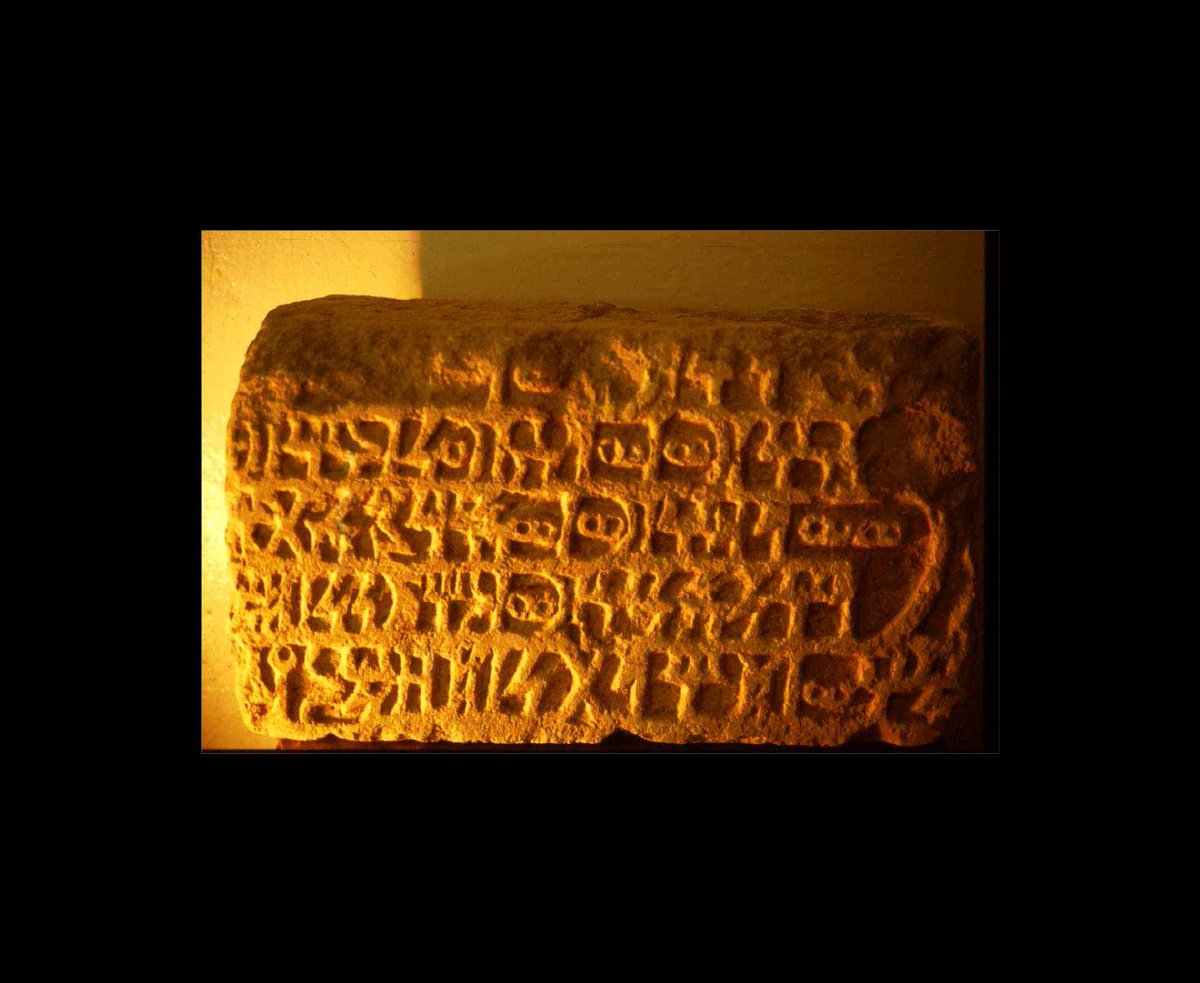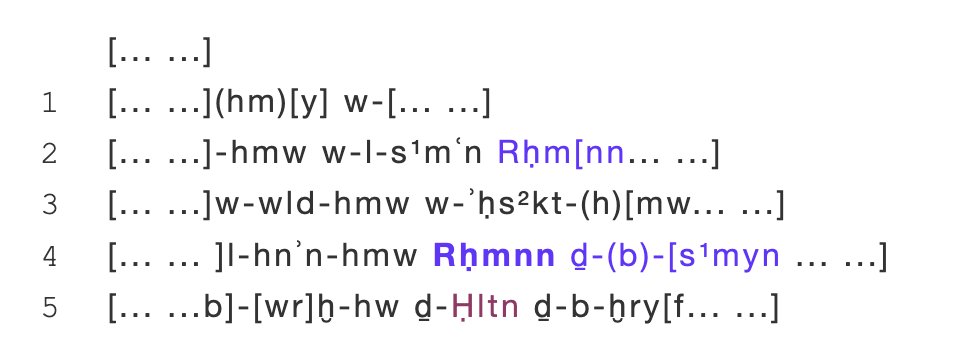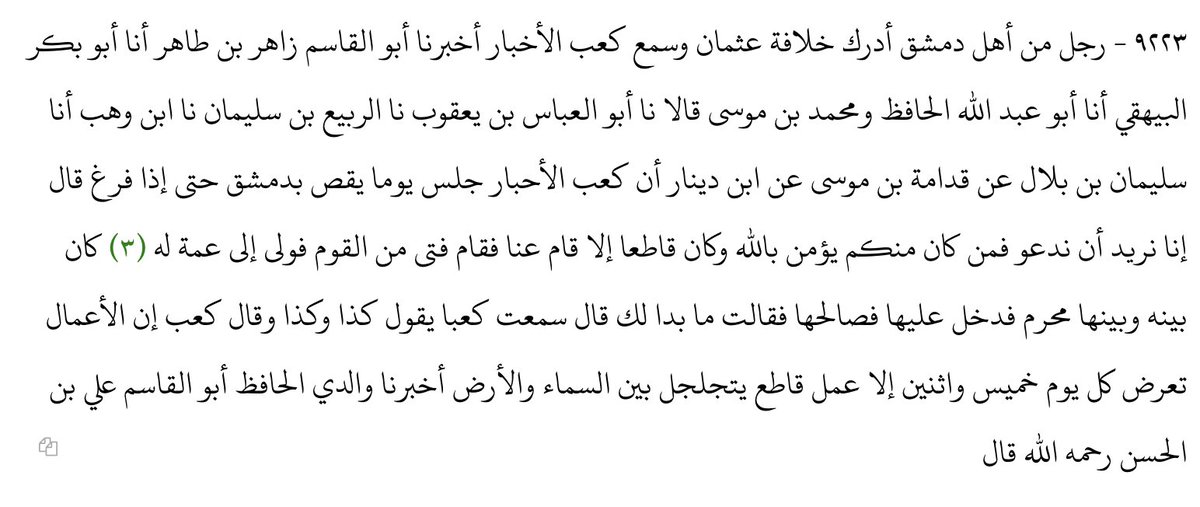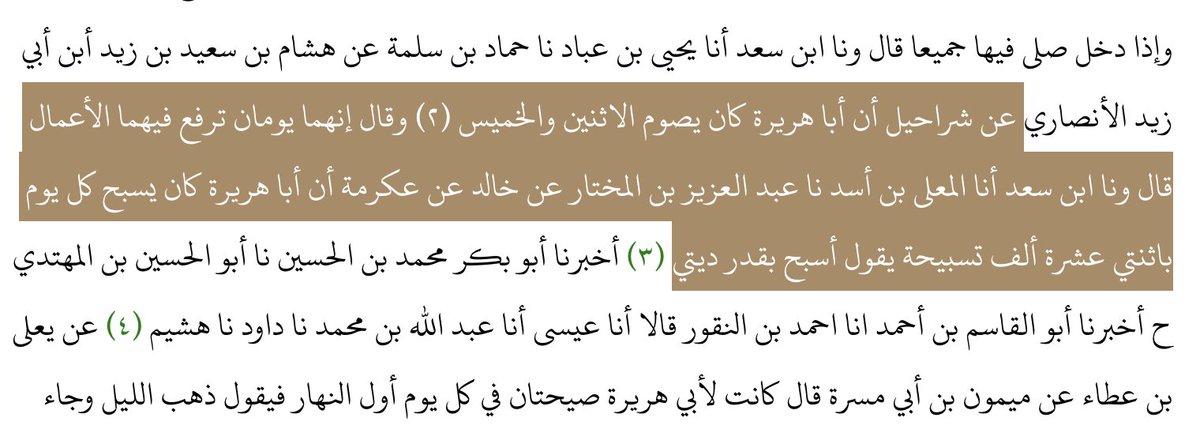Have you ever heard of 𐩧𐩢𐩣𐩬𐩬 or Raḥmānān?
It was the way Southern Arabs called God or Allah, according to archaeology and Late Sabaic inscriptions.
"Al-Rahman" (الرحمن) is most probably an arabization of this name of God.
It was the way Southern Arabs called God or Allah, according to archaeology and Late Sabaic inscriptions.
"Al-Rahman" (الرحمن) is most probably an arabization of this name of God.
This name has no specific link whatsoever to Mercy: archives are full of uses of "Rḥmnn" in various contexts, such as invoking power, protection and health from this entity.
This name was used by both Christians and Jews in Yemen and Southern Arabia.
This name was used by both Christians and Jews in Yemen and Southern Arabia.
I did a work, using the Qur'an, and checked how and when the name "Al Rahman" was used, and compared it with the use of al Rahim.
Al-Rahim has a very strong link to Mercy (forgiving sins, compassion, being Ever Relenting/Ghafur), no question about this.
Al-Rahim has a very strong link to Mercy (forgiving sins, compassion, being Ever Relenting/Ghafur), no question about this.
https://twitter.com/YetAnthrStudent/status/1612472970714251267
But this is definitely not the case with Al Rahman. The most clear verses are the ones from Surah Maryam, with Maryam seeking refuge to Al Rahman against an identified threat, or Abraham warning his father against the punishment of Al Rahman. 
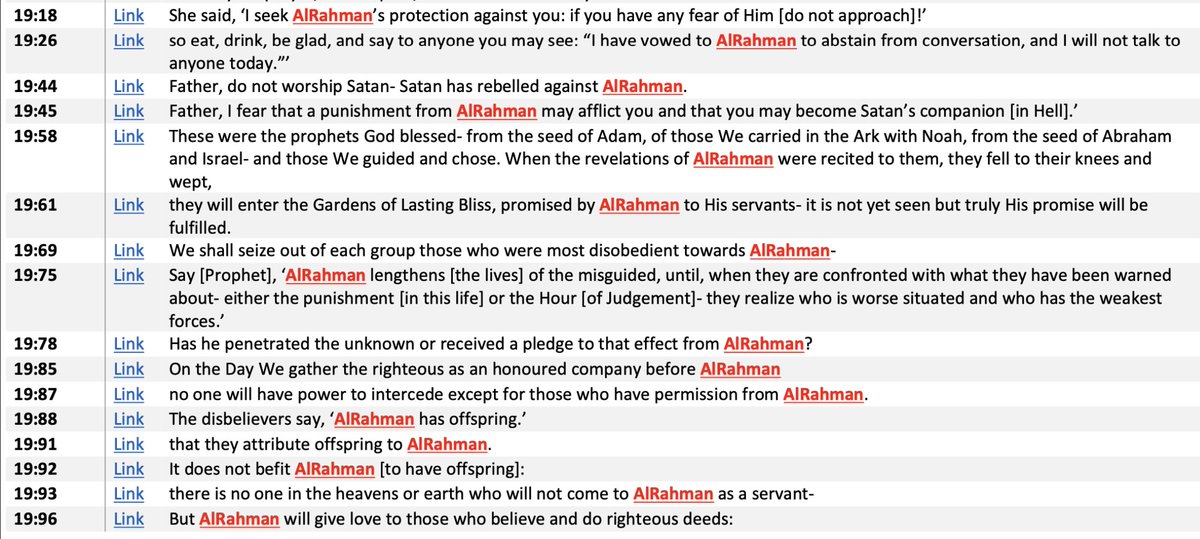
This is a strong hint showing Al Rahman is just the equivalent of Allah, and translating it with "the All Merciful" or "the Most Gracious" is plainly wrong.
It should be "the God" or "the Almighty".
17:110 gives a clear indication that the two names are equivalent.
It should be "the God" or "the Almighty".
17:110 gives a clear indication that the two names are equivalent.

Another interesting thing: Al Rahman is mostly used during the Meccan period, and only 3 times in the Medinan period. Maybe the da'wah towards Southern Arabs was at the beginning of Revelation, hence using "their" way of calling God was important mainly at the beginning?
Now, few examples taken from showing the use of Rḥmnn in various archeological artefacts. dasi.cnr.it

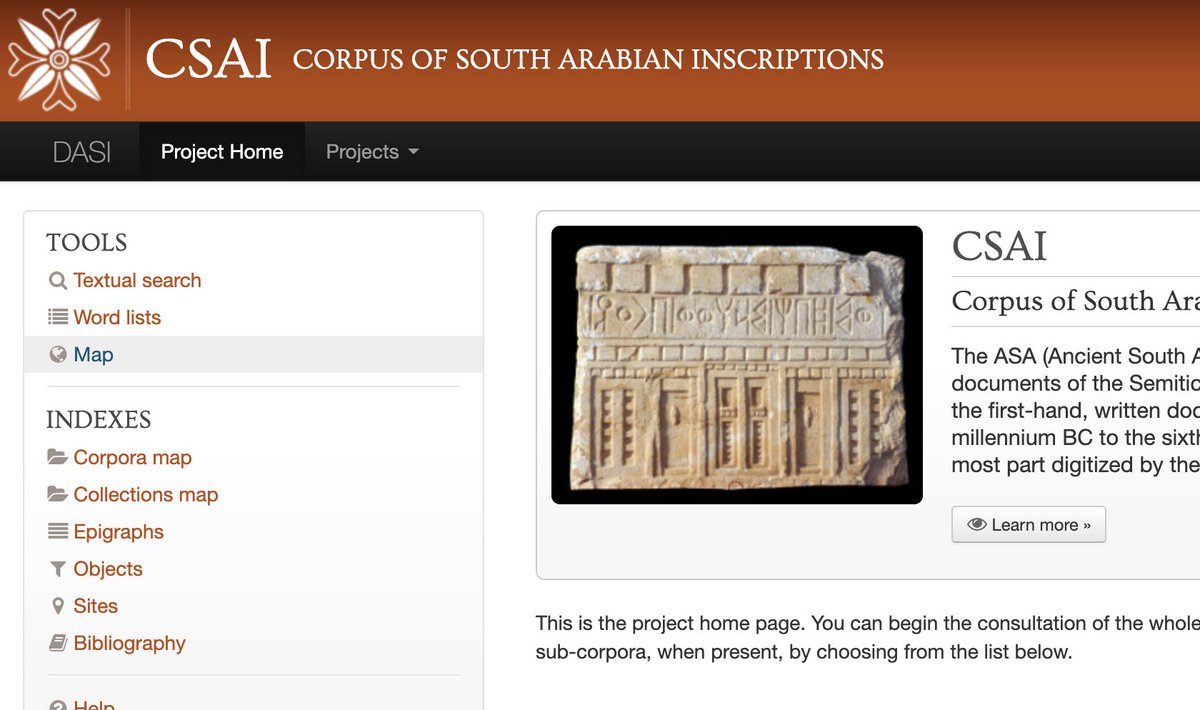
CIH 541, christian use:
"With the power, the aid, and the mercy of Rḥmnn, of his Messiah and of the Holy Spirit."
dasi.cnr.it/index.php?id=3…



"With the power, the aid, and the mercy of Rḥmnn, of his Messiah and of the Holy Spirit."
dasi.cnr.it/index.php?id=3…
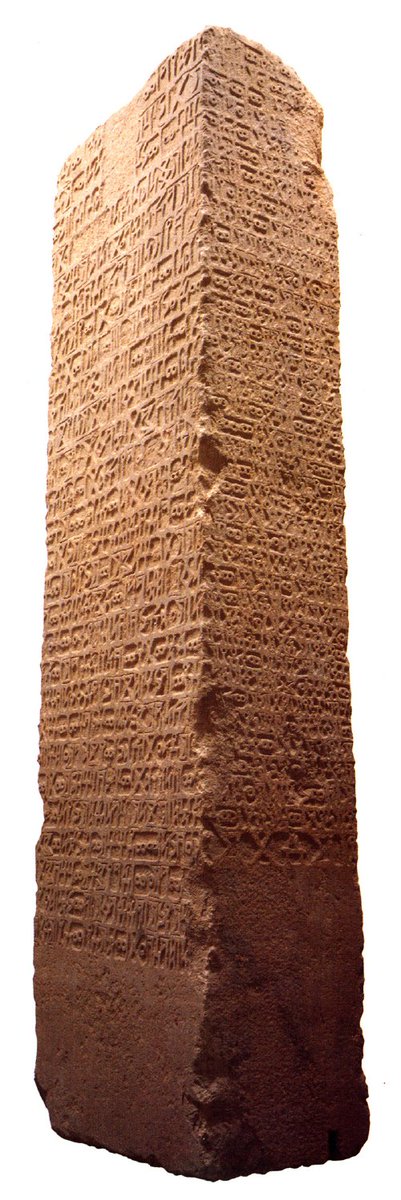
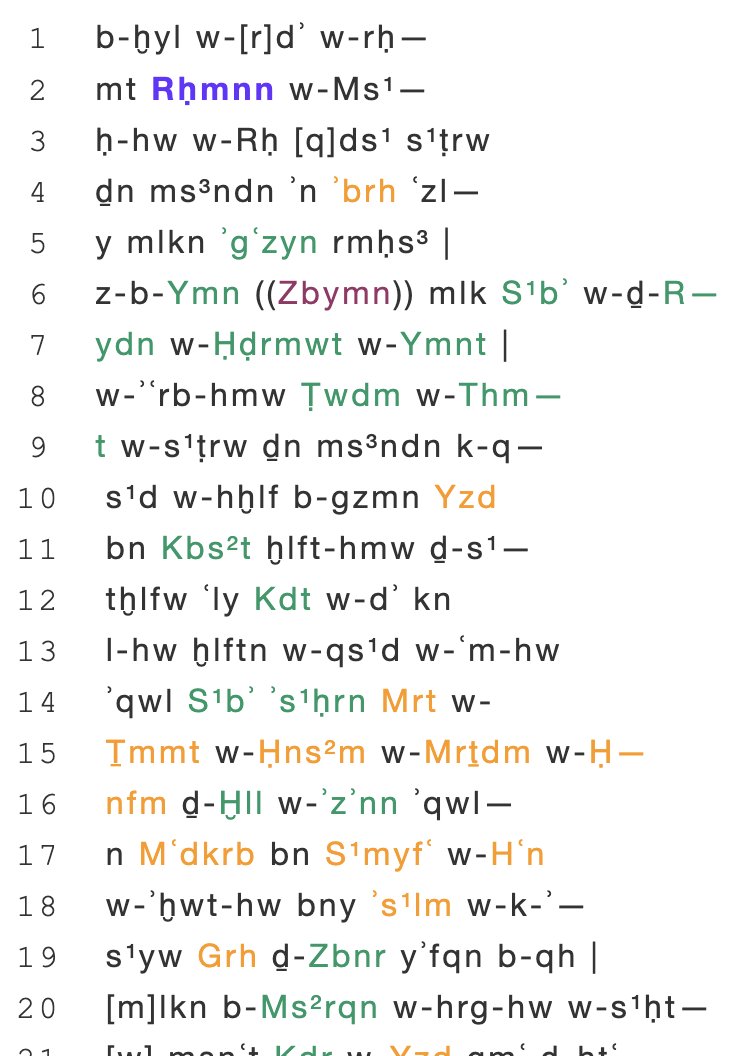
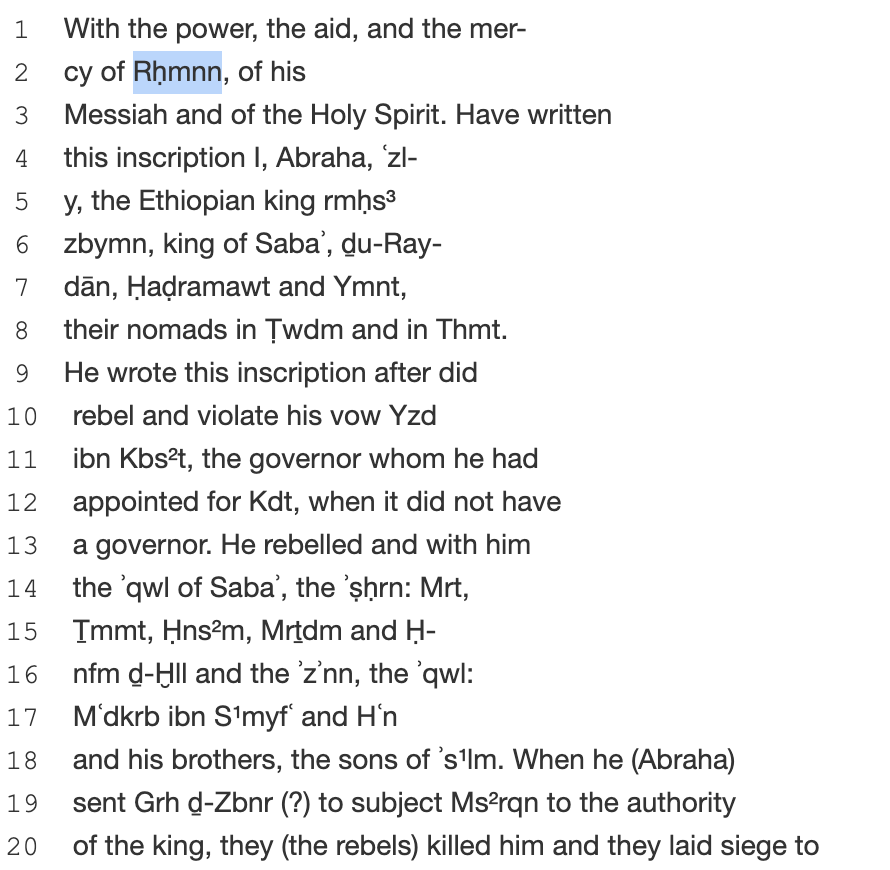
CIH 543, Jewish use:
"May bless and be blessed, the name of Rḥmnn, who is in the heaven, and Israel and their god, the lord of the Jews".
dasi.cnr.it/index.php?id=3…



"May bless and be blessed, the name of Rḥmnn, who is in the heaven, and Israel and their god, the lord of the Jews".
dasi.cnr.it/index.php?id=3…
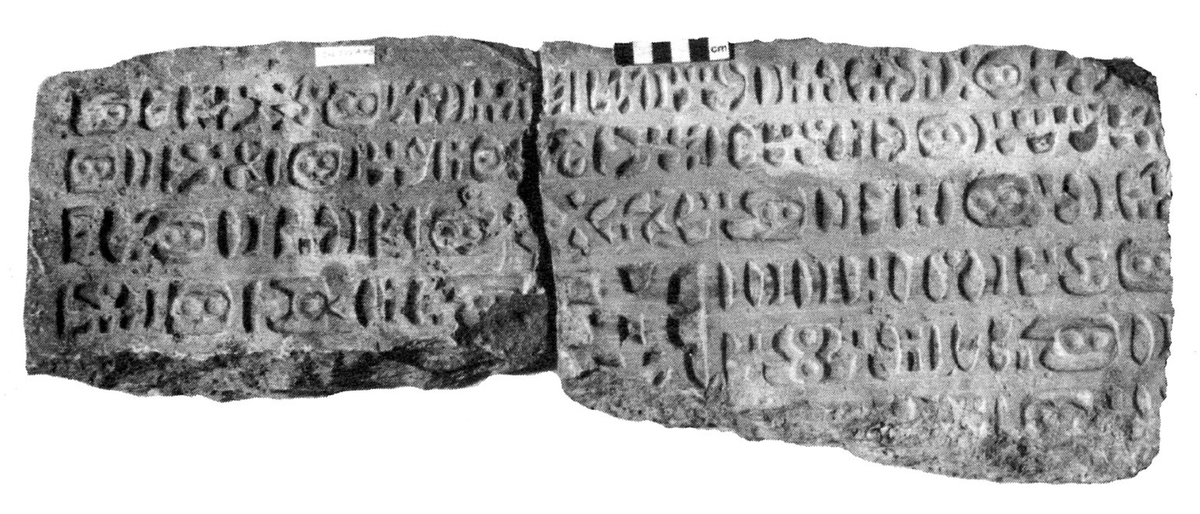
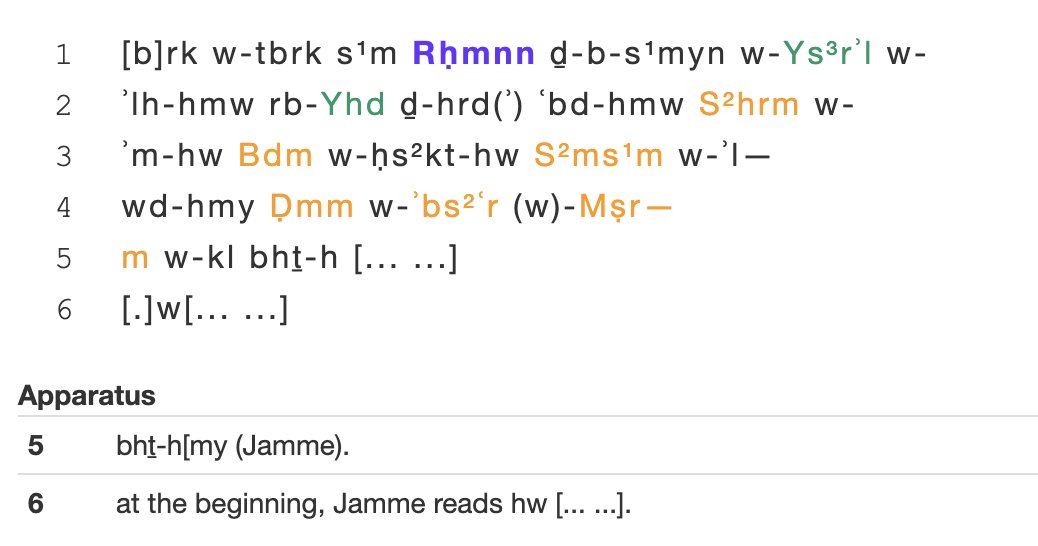

CIH 537+RES 4919:
-"with the help of Rḥmnn, the Master of heaven [...]"
-"might Rḥmnn grant to them prosperity. They entrusted their house, themselves, their sons to the protection of Rḥmnn, the Master of heaven."
dasi.cnr.it/index.php?id=3…



-"with the help of Rḥmnn, the Master of heaven [...]"
-"might Rḥmnn grant to them prosperity. They entrusted their house, themselves, their sons to the protection of Rḥmnn, the Master of heaven."
dasi.cnr.it/index.php?id=3…

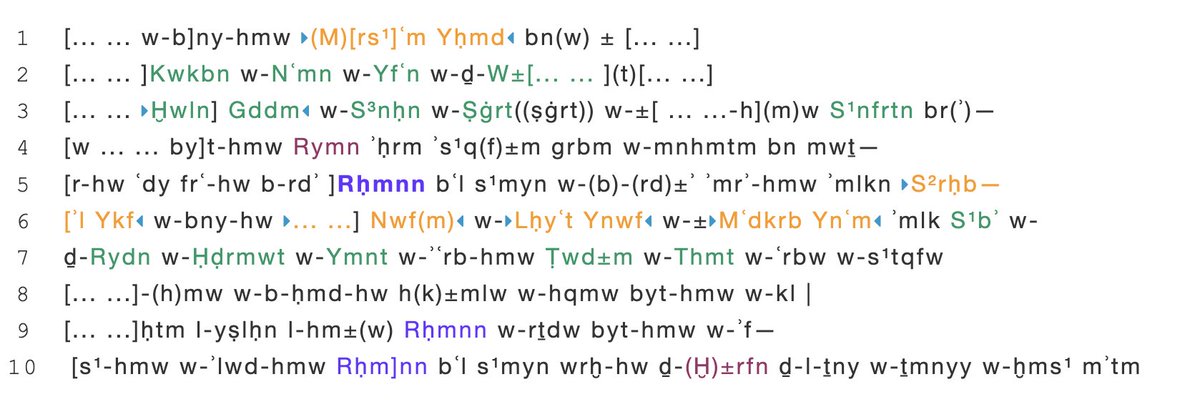

Ja 1028:
Context: Jewish king Dhu Nuwas.
-"Might Rḥmn bless their sons",
-"Might Rḥmnn, the Highest, protect it",
-"This insciption was placed, written, executed in the name of Rḥmnn. Tmm of Ḥḍyt placed . By the Lord of Jews. By the Highly Praised."
dasi.cnr.it/index.php?id=3…



Context: Jewish king Dhu Nuwas.
-"Might Rḥmn bless their sons",
-"Might Rḥmnn, the Highest, protect it",
-"This insciption was placed, written, executed in the name of Rḥmnn. Tmm of Ḥḍyt placed . By the Lord of Jews. By the Highly Praised."
dasi.cnr.it/index.php?id=3…
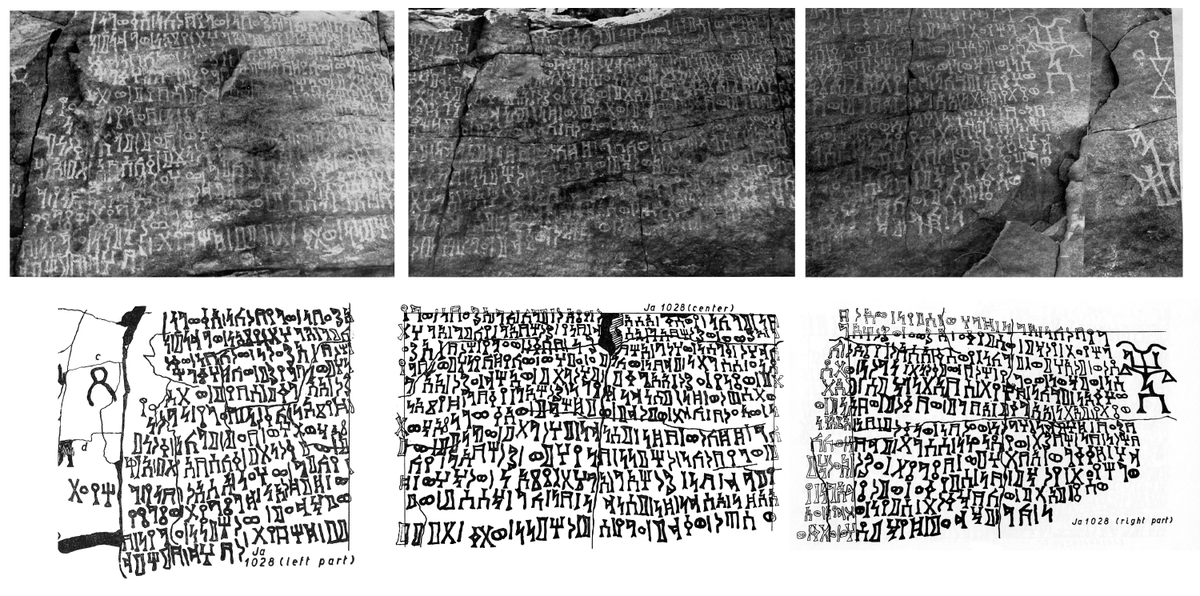

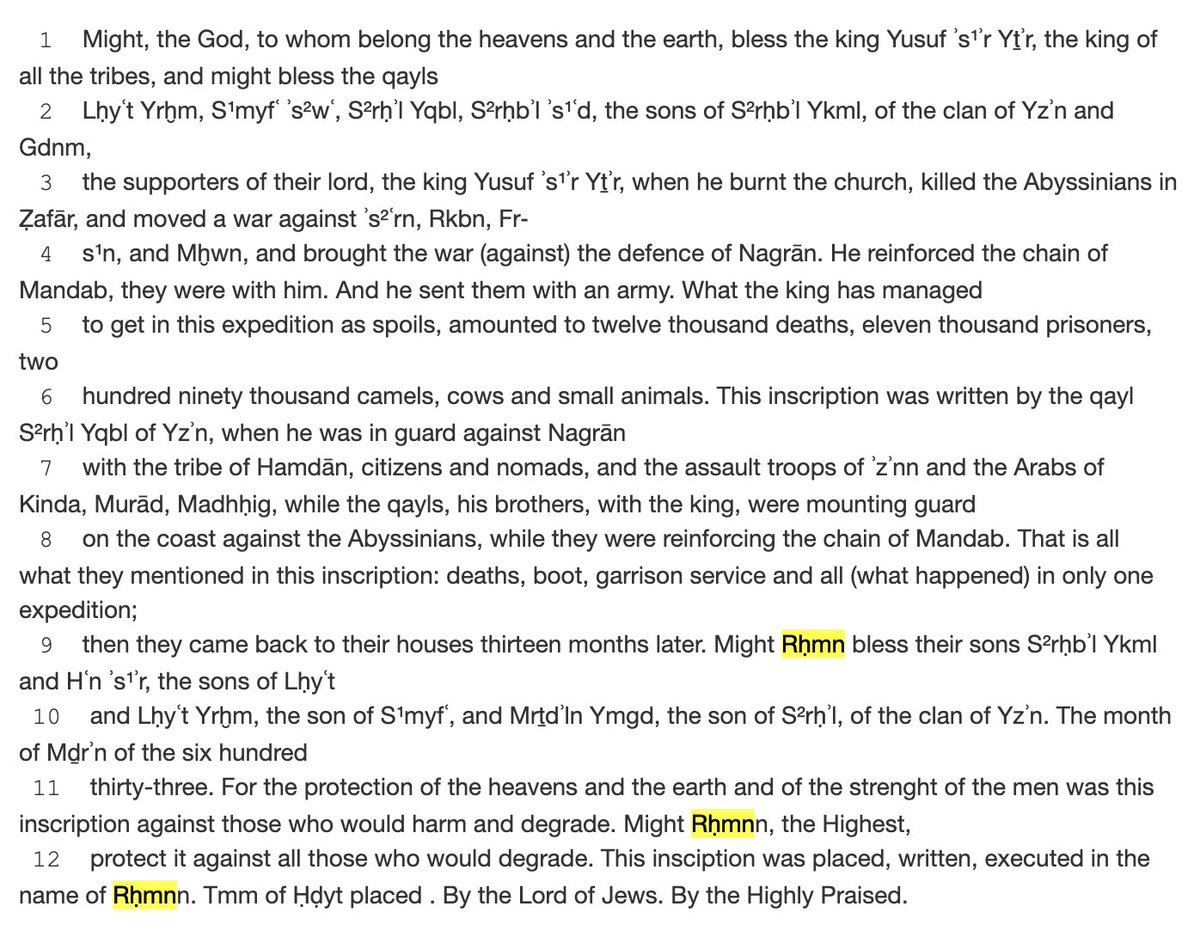
Ry 520:
Jewish context
"for their Lord Rḥmnn, Lord of the Heaven, in order that Rḥmnn might grant, to their wifes and to their sons to live a worthy life and to die a worthy death. That Rḥmnn may grant them healthy sons, militant for Rḥmnn's cause"
dasi.cnr.it/index.php?id=3…



Jewish context
"for their Lord Rḥmnn, Lord of the Heaven, in order that Rḥmnn might grant, to their wifes and to their sons to live a worthy life and to die a worthy death. That Rḥmnn may grant them healthy sons, militant for Rḥmnn's cause"
dasi.cnr.it/index.php?id=3…
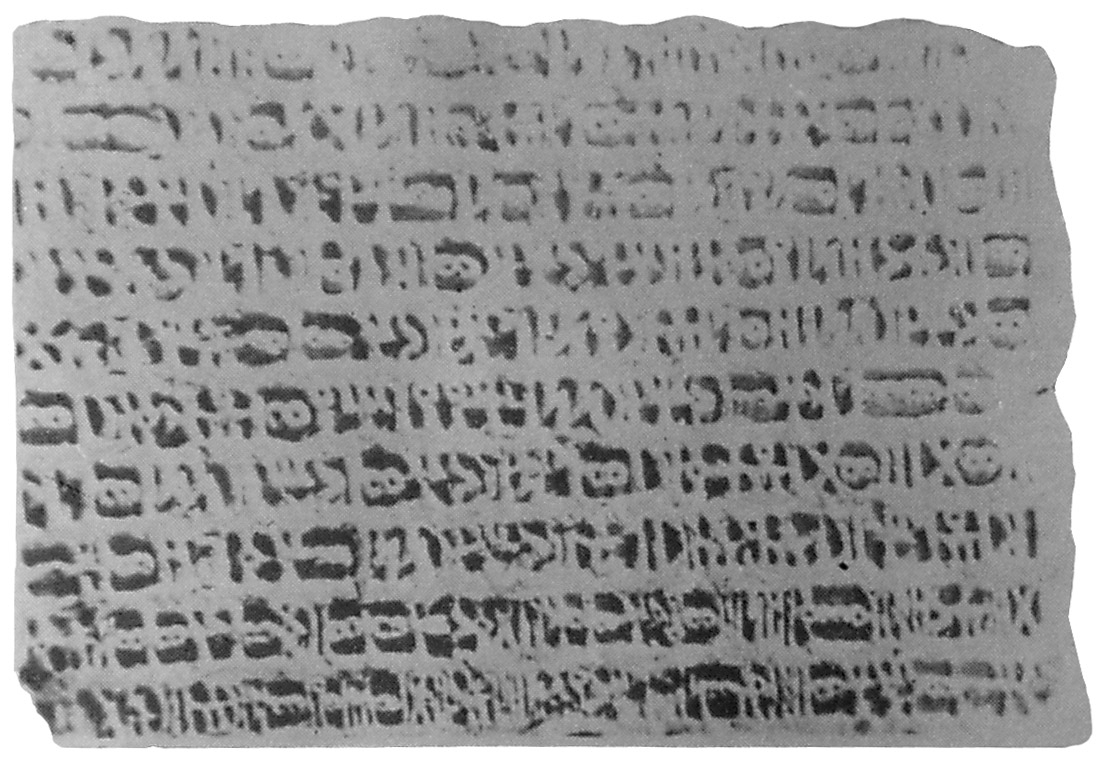
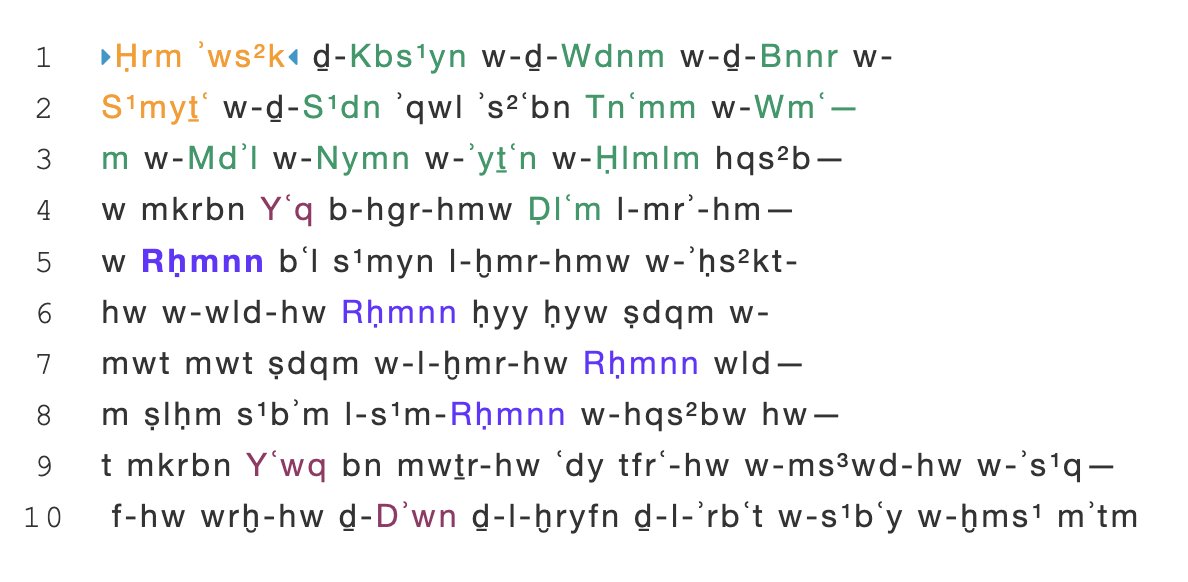
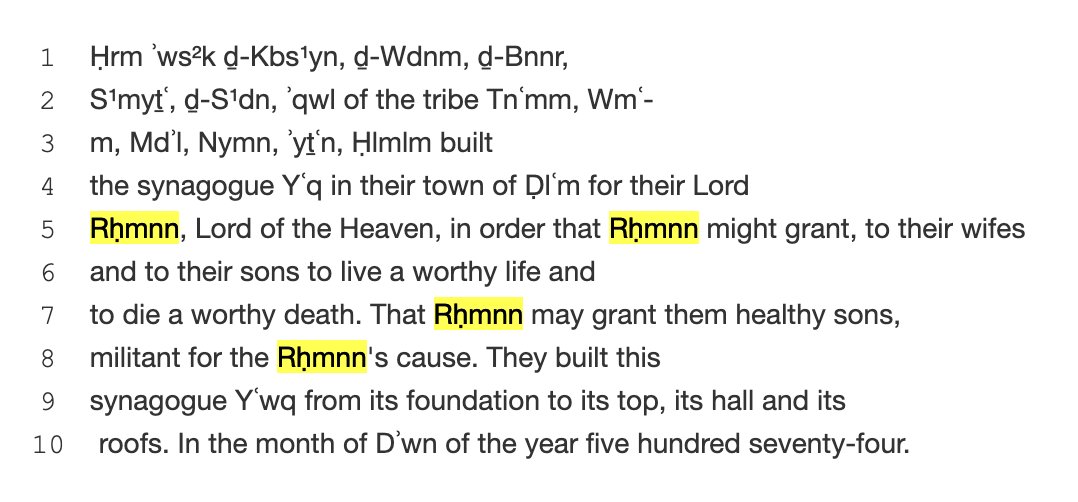
Is it even possible we have been misunderstanding the meaning of "Al Rahman" during 14 centuries?
Why do all the tafsir books miss this elementary and basic notion?
Why do all the tafsir books miss this elementary and basic notion?
@RamyGD08 If you replace AlRahman by "the Almighty" in all Quranic verses, everything falls into place:
https://twitter.com/YetAnthrStudent/status/1612472974480637952
@_carbonov_ @GurkanEngin_ @MunimSirry from what I saw this is indeed a very interesting website. Thanks!
@Alharbi131813 This is exactly this approach I am challenging. I say this is plainly wrong and incorrect. We try to use linguistic tools for a word that has been arabized, so it can't work. See all the examples I listed.
@N271720 also my youtube algo showed me this:
And the person mentioned in the video actually has a point. Then a pattern emerges. Then you somehow become obsessive about it and gather all the information and evidence, and let the text (quran) speak itself.
And the person mentioned in the video actually has a point. Then a pattern emerges. Then you somehow become obsessive about it and gather all the information and evidence, and let the text (quran) speak itself.
@N271720 but this question is crucial. Either the theory is all false but I mean I don't think I'm twisting words of the Quran just to fit a theory, it's rather the opposite.
Either the theory is true and it is basically a huge blow to anything related to tafsir.
Either the theory is true and it is basically a huge blow to anything related to tafsir.
@N271720 if the Islamic heritage got it all wrong on the most basic element of the Quranic speech, what does that tell? What does that mean?
How can I trust any scholar/clergy/intermediary who doesn't even understand the basic name of Allah? Should I even trust anyone? ....
How can I trust any scholar/clergy/intermediary who doesn't even understand the basic name of Allah? Should I even trust anyone? ....
@N271720 And I'm not saying this in an arrogant or degrading way, rather in the way of someone who is puzzled and becomes overly suspicious.
• • •
Missing some Tweet in this thread? You can try to
force a refresh

